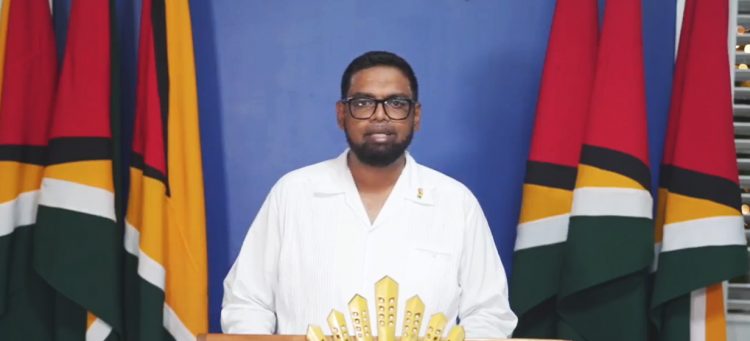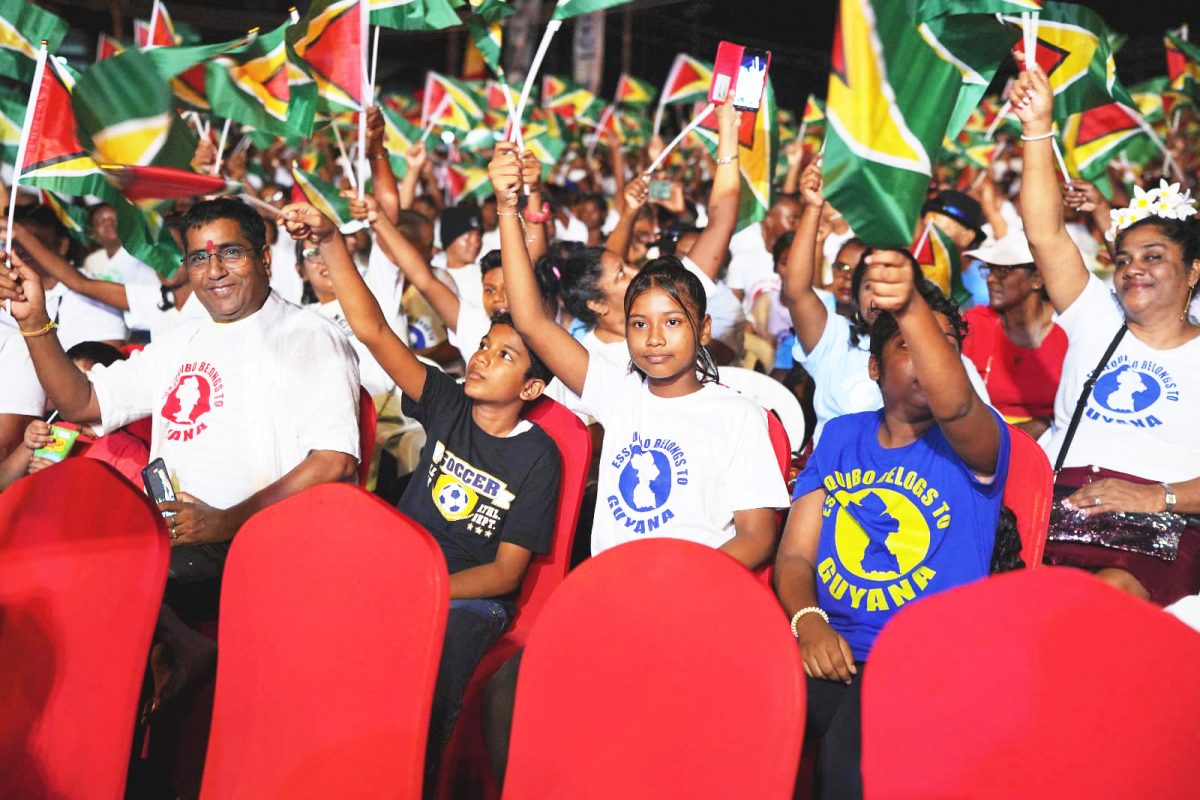In defiance of the ICJ, Venezuela’s President Nicolas Maduro yesterday announced a series of steps following Sunday’s referendum on Essequibo including handing out of exploration licences in the county and President Irfaan Ali last night said Guyana has contacted the UN Secretary General on this “imminent threat” and the army is on full alert.
Ali in an 11.20 pm statement said, “I address you on an unsettling development in relation to the unlawful claim by Venezuela to Guyana’s Essequibo region which constitutes more than two thirds of Guyana’s national territory. (Yesterday) President Maduro announced several measures which his government intends to take in enforcing the outcome of the referendum held on December 3, 2023.”
Ali said that since the announcement of the referendum he had made it clear that it was a direct threat to Guyana’s territory, sovereignty and political independence.

He stressed, that the measures announced are in “blatant disregard” of the order given by the International Court of Justice (ICJ) on December 1, 2023 which had said that the Caracas should do nothing to tamper with Guyana’s control of Essequibo. The ICJ had also called on Guyana and Venezuela to desist from taking any action which would aggravate the case presently before it.
“Guyana views this as an imminent threat to its territorial integrity and will intensify precautionary measures to safeguard its territory”, Ali said in a Facebook address.
According to Ali, last evening he spoke to the Secretary General of the United Nations, Antonio Guterres and several leaders “alerting them of these dangerous developments and the desperate actions of President Maduro that fly in the face of international law and constitute a grave threat to international peace and security.”
Additionally, Ali said that today Guyana will bring the matter to the United Nations Security Council (UNSC) “for appropriate action to be taken by that body” adding that they have also engaged Caricom, OAS, the Commonwealth and other bilateral partners including the United States of America, Brazil, the United Kingdom and France. Guyana will take up a seat on the UNSC in January.
With tension between the two countries at the highest it has ever been in decades following Sunday’s referendum and bellicose statements from Caracas, Ali also assured that the “Guyana Defence Force is on full alert and has engaged its military counterparts including the US Southern Command”.
Furthermore, the President said, that by defying the court Venezuela has rejected “international law, the rule of law generally, fundamental justice and morality and the preservation of international peace and security” and they have “literally declared themselves an outlaw nation.”
However, Ali said that nothing Venezuela does will stop Guyana from proceeding with the case at the level of the ICJ or stop the ICJ from ultimately issuing its final judgment on the merits of the case which is the upholding of the 1899 arbitral award as a full, final and perfect settlement of the boundary between the two countries.
“We will not allow our territory to be violated nor the development of our country to be stymied by this desperate threat”, he stressed.
Meanwhile, in responding to a question from Stabroek News on whether the Government of Guyana would report Venezuela’s announcement to the United Nations Security Council and the International Court of Justice given the latter’s order, Ali said, “Absolutely! Guyana will be reporting this matter, we have already spoken to the UN SG and early in the morning we will be officially writing the UN Security Council. We will be informing the court of this development” along with bilateral partners in the next 24 hours.
“Let me very clear that President Maduro’s action is in open defiance of the ICJ order. In my opinion he is testing the mettle of the ICJ. He is taken a lonely and worrisome road of neglecting his responsibility as a member of UN family, adventurous and reckless path that can only bring instability to this region and can only create more uncertain circumstances for the Venezuelan people.”
Ali urged President Maduro “to rethink these missteps” and to act and behave in accordance with international laws pointing out that everything done from Guyana’s end is aimed at ensuring the region remains a region of peace. “Our only ambition is for this region to remain a region of peace, a zone of peace and for the territorial integrity and sovereignty of Guyana to be respected. We ask for nothing more or nothing less.”
Responding to a question from the Guyana Times as to what government’s message is to investors in light of Venezuela’s announcement, Ali stressed that the message is very clear “your investment is in a safe, democratic, stable country in which the rule of law prevails. You have nothing to worry about when you invest in a country that governs itself in accordance with the rule of law, that stands on the side of democracy and that understand what true freedom is so there is nothing to fear.”
Further, Ali said, that Guyana’s international partners and the international community is ready to support Guyana and have given that assurance “and all we want for these missteps to be corrected by President Maduro and for Venezuela and the government of Venezuela to commit itself to peace and to act in a manner that is befitting of a member of the United Nations family.”
Speaking directly to Guyanese, the President said, “We are here to ensure the safety of this country, the territorial integrity of this country, the sovereignty of this country and to protect every citizen.”
According to Reuters, Maduro said yesterday he would authorize oil exploration in an area around the Essequibo River, even though the territory is the subject of a controversy with Guyana. This area has always been in control of Guyana and no Venezuela-backed explorer would likely come.
Maduro also said that state oil company PDVSA and state iron and steel maker CVG will create divisions for the Essequibo region.
The state companies will “immediately proceed to create the division PDVSA Esequibo and CVG Esequibo and immediately we’ll proceed to give operating licenses for the exploration and exploitation of oil, gas and mines in our Guayana Esequiba,” he said on state television.
Maduro also said he has proposed a law to the government-controlled legislature to create the new state, and companies already operating in waters in the area would have three months to leave. The latter appeared to be a reference to ExxonMobil’s operations which are however not presently producing in that area.
Guyana, which is currently producing some 400,000 barrels per day of oil and gas, this year received bids for new shallow water and deep water blocks from local and foreign companies in its first international bidding round. The exploration licenses for those areas have not been signed but this had nevertheless triggered fierce opposition from Caracas.
Venezuela has grown increasingly hostile in a bid to force Guyana back to the negotiating table over Essequibo, a move Georgetown has ruled out as it is currently before the ICJ on the substantive matter.
In addition to this, Maduro has ordered that a new map that includes Essequibo be dispersed to sectors of the Bolivarian republic.
In a statement, made during the General Assembly of the Federal Council of Government, Maduro further announced that Venezuelan nationality will be granted to all individuals residing within the territory.
“The people have decided to nationalize all citizens in that territory with their Venezuelan identity card, acknowledging them as brothers of our country, and to create the state of Guayana Esequiba …We are going to seek justice and restore Venezuela’s rights over Guayana Esequiba. Our country will come together”.
Along with demanding prompt action, Maduro urged the National Assembly to discuss and adopt the organic law establishing Guayana Esequiba. The “Five Yesses,” or the five decisions made by the Venezuelan people that were put to a vote in the referendum, would all be included in this law that would establish the state’s legal framework. During the announcement, the President gave Dr. Jorge Rodriguez, the President of the National Assembly, the proposed organic law.
Venezuela’s highest legal framework is found in the Organic Law of Venezuela. Adopted in 2001, it superseded the preceding constitution from 1961 and addresses a number of topics, such as the government’s structure and operations, the rights of citizens, the legal system, election processes, and public administration. In addition to covering housing, health care, education, indigenous rights, and environmental protection, it places a strong emphasis on social justice, human rights, and solidarity.
Maduro also disclosed plans to create the Integral Defense Zone of “Guayana Esequiba”. This zone would be essentially administered by the Guyana Integral Defense Region and comprises three areas of integral development and 28 sectors within the Essequibo region. In the interim, Major General Rodriguez Cabello has been designated as Guayana Esequiba’s only political and administrative authority in the town that they are taking over, pending further legislative discussions on the subject.
Further, Maduro asked the relevant Vice Presidents and Ministers to support the initiative and provide all schools with a fresh map that shows the “new Venezuela” which has been created as a result of the December 3 decision.
Additionally, Maduro suggested a unique law to create national parks and environmental protection zones in “Guayana Esequiba”. These protected areas would work to protect the region’s biodiversity and encourage environmentally conscious travel.
“I propose to the National Assembly to approve a special law decreeing environmental protection areas in Guayana Esequiba and new protected national parks that will be centres of biodiversity and life tourism in Guyana Esequiba,” he said.
Turnout at the referendum on Sunday was said to have been poor.
Since Guyana found oil in 2015, Maduro has stepped up pressure. Smarting from US sanctions and a collapsed economy that has seen eight million Venezuelans flee the country, there is a view that the President is trying to position himself for the general elections that are due next year.
In the wake of Venezuelan aggression, the government and the GDF have kept up a flurry of engagements to nail down support from the international community and to dissuade Venezuela from any reckless action.





